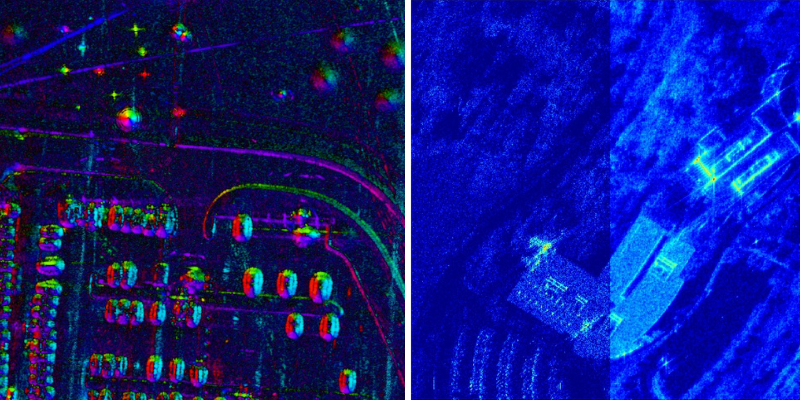Radar Systems Graduate Certificate
The Dayton region's employers are leaders in the areas of aerospace sensing and radar.
This graduate certificate is ideal for working professionals in the areas of radar and other sensor applications. Participants should have an undergraduate degree in engineering or a related field, or should have commensurate work experience.

Learning Outcomes:
- Gain introductory knowledge of radar systems, including the ability to
analyze performance and conduct initial design trades. - Gain introductory knowledge of electronic warfare, and its impact on and relevance to radar and communication systems.
- Gain knowledge of advanced radar applications and techniques.
Certificate Features:
- All courses will be delivered in a fully-hybrid format with the option to choose between in-person attendance, online attendance or asynchronous (i.e., recorded) participation on a meeting-by-meeting basis. No in-person or synchronous course requirements.
- No time-consuming projects or high-stakes exams.
- All certificate courses are graduate courses approved for inclusion in an M.S. or Ph.D. program of study.
- Apply now or get started quickly under nondegree status. Note: Application to the graduate certificate program (or another graduate program) is required after the completion of two courses under nondegree status.
Required Courses:
- ECE 576: Introduction to Radar (3 credit hours)
- Introduction to the radar range equation, fields and waves, antennas and
phased arrays, beamforming, targets, and clutter radar cross-section, fast
time, slow time, detection processing, tracking, space-time adaptive
processing, FMCW radar, SAR and ISAR, electronic warfare, transmitters,
receivers and signal processors.
- Introduction to the radar range equation, fields and waves, antennas and
- ECE 577: Introduction to Electronic Warfare (EW) (3 credit hours)
- Overview of the Principles of Electronic Warfare (EW). Review of radar (and
radio frequency communication) systems engineering, including fields and
waves, waveforms, antennas and array beamforming, target detection and
image processing, tracking, space-time adaptive processing (STAP),
synthetic aperture radar (SAR), Inverse SAR (ISAR). Principles of direction
finding (DF), Electronic Attack (EA) of MTI (moving target indication) radar,
SAR, and digital radio frequency memory (DRFM). Principles of Electronic
Protection (EP) in MTI and SAR. Low Probability of Intercept (LPI) radar and communications, Electronic Intelligence and STAP, Electronic Support Measures (ESM).
- Overview of the Principles of Electronic Warfare (EW). Review of radar (and
- ECE 578: Advanced Radar (3 credit hours)
- Review of the radar range equation, fields and waves, antennas and phased arrays, beamforming, targets and clutter radar cross-section, fast time, slow time, detection processing, tracking, frequency modulated continuous wave (FMCW) radar, synthetic aperture radar (SAR) and Inverse SAR (ISAR), electronic warfare (EW), transmitters, receivers, and signal processors. Advanced space-time adaptive processing (STAP) techniques, including the Generalized Likelihood Ratio Test, Non-Homogeneity Detection, Knowledge- Based STAP, and Constant False Alarm Rate detection processing.

Prof. Brian Rigling received a B.S. degree in physics-computer science from the University of Dayton in 1998 and received M.S. and Ph.D. degrees in electrical engineering from The Ohio State University in 2000 and 2003, respectively.
From 2000 to 2004, he was a radar systems engineer for Northrop Grumman Electronic Systems. In 2004, Prof. Rigling joined the Department of Electrical Engineering at Wright State University, and was promoted to associate professor in 2009, professor in 2013, department chair in 2014 and Dean of Engineering and Computer Science in 2018. In 2010, he was employed at Science Applications International Corporation as a Chief Scientist.
In 2022, Prof. Rigling accepted an appointment in the Department of Electrical and Computer Engineering at the University of Dayton as a professor and Ohio Research Scholar for Sensor Exploitation and Fusion. He has authored chapters for 4 textbooks, more than 130 conference and journal papers and has participated in more than $60M in collaborative research projects through a variety of funding sources.
Prof. Rigling currently serves as an associate editor for IEEE Transactions on Radar Systems. He was the general chair for the 2014 IEEE Radar Conference, was awarded the 2015 IEEE Fred Nathanson Memorial Radar Award and was elevated to IEEE Fellow in 2018.
